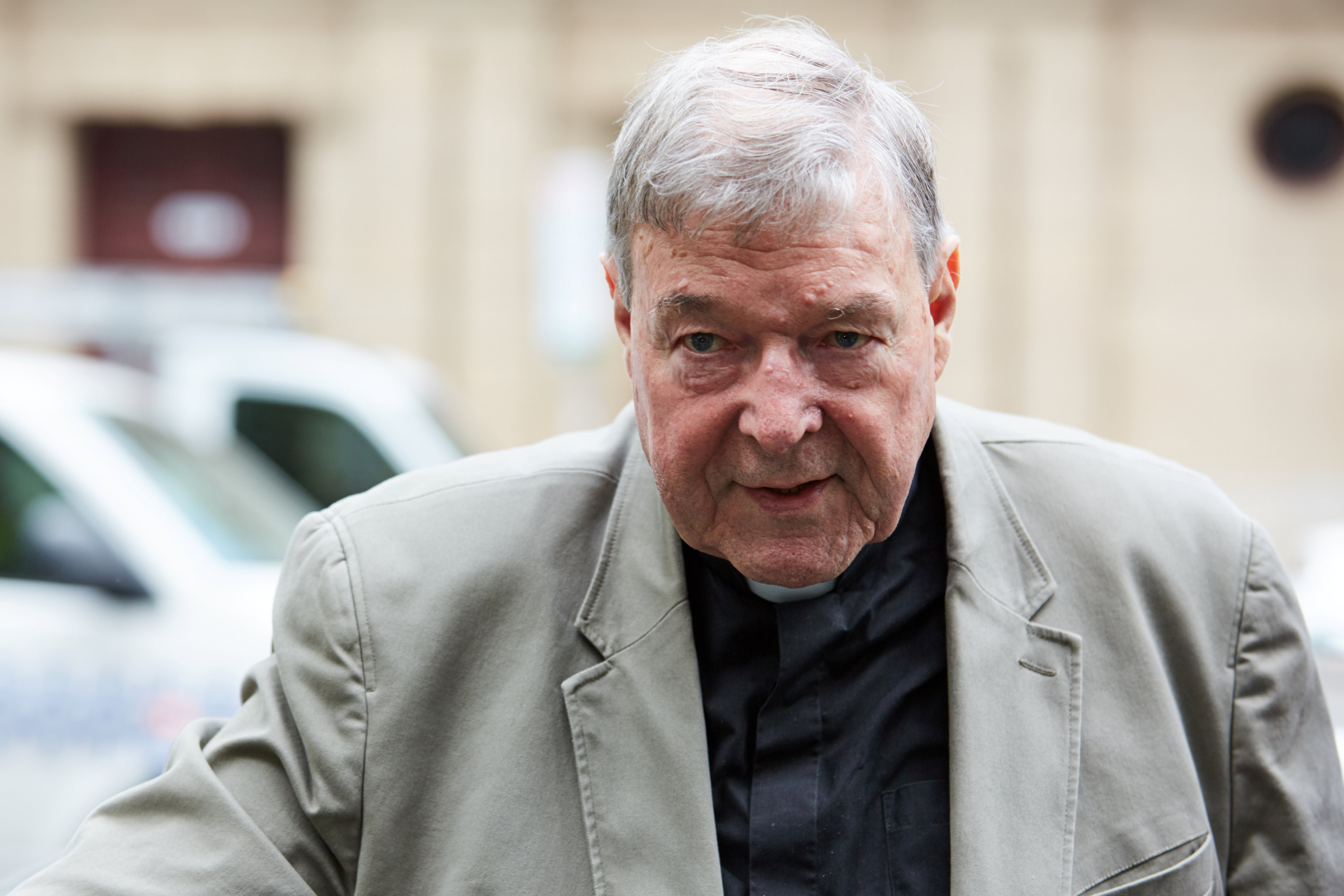Read the full statement of Witness J in the Pell abuse case.
An Australian appeals court has upheld the conviction of Cardinal George Pell and he will remain behind bars for sexually assaulting two choirboys more than two decades ago.
The Cardinal's appeal was dismissed by the Victorian Court of Appeal in Melbourne – a 2-1 split decision by the judges that opens the way for a possible High Court hearing
Meanwhile the Vatican continues to conduct its own investigation of Cardinal Pell, one of the Church’s most senior global figures, and he faces a potential Vatican trial and removal from the clerical state.
Outside the court, protesters including advocates for victims of child sexual abuse celebrated the decision to uphold the cardinal’s conviction.
But Victoria’s Chief Justice Anne Ferguson made it clear Cardinal Pell “should not be made a scapegoat for any perceived failings of the Catholic Church nor for any failure in relation to sexual abuse by other clergy”.
Pell, 78, will continue to serve his sentence of six years' imprisonment.
He will remain eligible to apply for parole after he has served three years and eight months of the sentence.
It was Chief Justice Ferguson and President of the Court of Appeal Justice Chris Maxwell who dismissed the appeal, finding that that there was enough evidence at trial for the jury to convict Cardinal Pell beyond reasonable doubt.
Justice Mark Weinberg was in the minority, ruling that Pell's conviction should have been overturned.
Pell was convicted of one charge of sexual penetration of a child under 16 and four of committing an indecent act with or in the presence of a child.
Last December, a jury upheld the prosecution case that Cardinal Pell abused two choirboys, both aged 13, in the sacristy of Melbourne’s St Patrick’s Cathedral on a Sunday in December 1996, and then separately attacked one of the boys in the cathedral corridor early in 1997.
Cardinal Pell was convicted on the strength of the evidence given by one of the victims, now a man in his 30s. The other victim died in 2014 and never reported any abuse.
Chief Justice Ferguson said the complainant (the surviving victim) was "a very compelling witness, was clearly not a liar, was not a fantasist and was a witness of the truth".
In his dissenting judgement, Justice Weinberg, found that at times the complainant was inclined to embellish aspects of his account and that his evidence contained discrepancies, displayed inadequacies and otherwise lacked probative value.
Justice Weinberg said this had caused him to have a doubt as to the applicant’s guilt.
Justice Weinberg could not exclude as a reasonable possibility that some of what the complainant said was “concocted, particularly in relation to the second incident”.
Justice Weinberg found the complainant’s account of the second incident was “entirely implausible and quite unconvincing”.
Concluding, Justice Weinberg said: “there is, to my mind, a ‘significant possibility’ that the applicant in this case [Cardinal Pell] may not have committed these offences. That means that, in my respectful opinion, these convictions cannot be permitted to stand.”
Pell's main ground of appeal was that his guilty verdicts were unreasonable and evidence presented to the jury could not support a guilty verdict.
His lawyers argued he was never left unattended by church officials while he was robed, that the choirboys couldn’t have re-entered the building from outside without being seen, that Pell’s practice of meeting parishioners after mass gave him an alibi and that his cumbersome robes made the sexual assault allegations physically impossible.
Two of the judges dismissed these and other “obstacles” to Cardinal Pell committing the crime that his lawyers had argued.
They found there was nothing about the complainant’s evidence that meant the jury must have had a doubt about the account.
“It is not enough that the jury might have had a doubt, but they must have had a doubt,” Chief Justice Ferguson said.
The chief justice also told the court that the three judges unanimously agreed to refuse leave to appeal on the two other grounds: that the cardinal should have presented his not guilty plea in person to the trial rather than by video, and that the cardinal's lawyers were not permitted to play a 19-minute animation to the jury in their closing statement.
This video re-enacted the movements of cathedral staff in and around the sacristy during a typical Sunday Mass when Pell was archbishop there.
The trial judge disallowed the video, saying it amounted to new evidence.
Cardinal Pell’s spokesperson issued a statement expressing disappointment at the decision and maintaining his innocence: “His legal team will thoroughly examine the judgment in order to determine a special leave application to the High Court. While noting the 2-1 split decision, Cardinal Pell maintains his innocence. We thank his many supporters.”
Outside the Melbourne court Vivian Waller, lawyer for the complainant, read out a statement on behalf of her client:
“I am relieved by the decision of the court of appeal. It is four years since I reported to the police. The criminal process has been stressful. The journey has taken me to places that in my darkest moments I feared I would not return from.
“Some commentators have suggested that I reported to the police somehow for my own personal gain. Nothing could be further from the truth. This is not about money and never had been.
“Some commentators have suggested that I am somehow out to cause damage to the Catholic Church. I’m not on a mission to do anybody any harm. Although my faith has taken a battering it is still a part of my life, and part of the lives of my loved ones.
“Despite this, I appreciate that the criminal process afforded Pell every opportunity to challenge the charges and to be heard. I am glad he had the best legal representation money can buy. There are a lot of checks and balances in the criminal justice system and the appeal process is one of them.
“I just hope that it is all over now.”
In response to the Court of Appeal’s decision, the president of the Australian Bishops’ conference, Mark Coleridge, said: “The Victorian Court of Appeal has today announced that, in a 2-1 decision, Cardinal George Pell's appeal against his convictions for child sexual abuse offences has been dismissed.
“The Catholic Bishops of Australia believe all Australians must be equal under the law and accept today’s judgement accordingly.
“Cardinal Pell’s legal team has said it will examine the judgement in order to determine a special leave application to the High Court.
“The bishops realise that this has been and remains a most difficult time for survivors of child sexual abuse and those who support them. We acknowledge the pain that those abused by clergy have experienced through the long process of the trials and appeal of Cardinal Pell. We also acknowledge that this judgement will be distressing to many people.
“We remain committed to doing everything we can to bring healing to those who have suffered greatly and to ensuring that Catholic settings are the safest possible places for all people, but especially for children and vulnerable adults.”
The Archbishop of Melbourne, Peter Comensoli, issued a separate statement, saying he respected the court’s decision.
“I encourage everyone to do the same,” said Archbishop Comensoli.
He said the “complexity of the search for the truth in this matter has tested many, and may very well continue to do so”.
"My thoughts and prayers are with the man who brought this matter before the courts. I humbly acknowledge it has been a challenging time for him, and I stand ready to offer pastoral care and spiritual help, should he seek it.
"In Christian charity, I will ensure that Cardinal Pell is provided pastoral and spiritual support while he serves the remainder of his sentence, according to the teaching and example of Jesus to visit those in prison." (Matthew 25:36)
A summary of the Victoria Court of Appeal conclusions in the Pell vs the The Queen case, a video of the summary being delivered, and the full reasons of the court, are available online.



 Loading ...
Loading ...